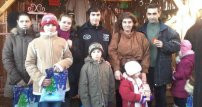 Jozsef Fekete was my classmate in Kossuth Lajos high school in Berehovo. After graduation our paths diverged, and he went out of my sight. Today he lives in Rakhiv in a large family because with his wife they are taking care of ten children. At this time I talked to him about life, family and children.
Jozsef Fekete was my classmate in Kossuth Lajos high school in Berehovo. After graduation our paths diverged, and he went out of my sight. Today he lives in Rakhiv in a large family because with his wife they are taking care of ten children. At this time I talked to him about life, family and children.
- How long do you live in Rakhiv?
- We moved to Rakhiv in 2013.
- Did you move there only to become foster parents?
- In fact, my wife and I are foster parents since October 10, 2008 but we wanted to expand our family with children in need.
- Where did the idea come from? What prompted you to adopt children?
- Our own children. David wanted siblings. After two girls, Dian and Gobica, were placed with us their stories inspired us for further children help. During that time our second child Rebecca was born.
- Do your own children tend to envy other children, or otherwise?
- It does not happen. Not David, he is already grown up. Rarely it happens to Rebecca, but she is only six years old.
- You said that you are the foster parents since 2008. Where did you live before?
- We lived in Balazher, district of Berehovo.
- Do you or your wife have any professional qualifications in the educational field?
- No, I am a turner, and my wife has a secondary education.
- Do you have a possibility to work? I mean do you have a job?
- Educating children is our main work, in fact, it is our profession.
- Are there any children who no longer live with you in the house?
- Yes, one child. Gobica is married. At this point two Demeter, Paulina, Oksana, Lotsiko, Karolina, Dia and Marina live with us.
- Do you keep in touch with the children who have become independent?
- Yes, we do. Gobica is for one and a half years married and we still have a close relationship. She regularly visits us, and we communicate through the telephone or via the Internet on daily basis.
- Judging by the names of the children you are taking care not only of Hungarian orphans. Does the child nationality matter? And if so, to what extent? I assume you both own the Ukrainian language well, so there shouldn't be any problem if a child speaks only official language.
- For us does not matter the nationality of children. We speak Hungarian in family, therefore children we have also learn it. Last year son Demeter won a competition of Hungarian poetry in the upper Tisza region, and this year he became the second. He learned Hungarian in our household. In addition, we are parishioners of the Roman Catholic Church, children receive a Catholic education. There is a Hungarian four year school in Rakhiv which younger children attend. The older ones learn the language in Sunday school at Rakhiv Roman Catholic parish. We learn the Ukrainian language now because during our school years in the Soviet Union the official language was Russian. However, we have no language problems in our family.
- Can you tell a bit more about this program? Who finances it? Exactly how children get into your family?
- Children's education is funded by the state. The competent authorities organize a meeting with children in need. After successful meeting administrative matters are being settled, after which kids are located in the family.
The orphanage, named after St. Vincent de Paul, and the property itself belongs to the Roman Catholic parish of Rakhiv. The idea of creating a family home belongs to the abbot of the parish Laszlo Mikulyak, and we agreed to become foster parents. We are being helped by the parish, urban management authorities of the 5th District of Budapest, Hungarian organization VONESZO (http://www.voneszoalapitvany.hu/index.php?oldal=kapcsolat.php) and individuals.
- I am sure you live with children in a large house in which needs to be maintained. Therefore, you are busy 24 hours a day. How do you handle everything?
- We live in a four-story house with a garden, so the bills are quite high. The house is heated day and night. Everyday tasks are handled with a well-coordinated teamwork. So we can cope with everything.
- What does your typical day look like?
- It's extremely busy. Awaking, morning wash, breakfast, preparation for school and kindergarten. While kids are at school we do shopping, cooking, cleaning, taking care of the government affairs, do gardening, depending on the season and choping wood. There is lunch after school, then music school, afterschool activities, relevant lessons and homework. Then there is dinner, free time, games, TV, evening wash, prayer and sleep. I won't go into details about the sizes of what we cook, amount of cloth we wash or dishes we clean.
- To what extent does the church control the parenting, and to what state? Do the competent authorities check on children?
- Children liked Catholic education which is dominant in their education. The Church, as well as the state is concerned only about the interests of children. Inspections occur on regular basis.
János Lengyel
Kárpátalja.ma

